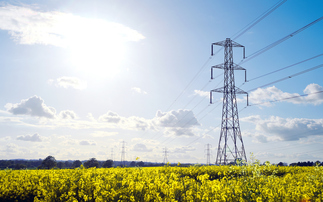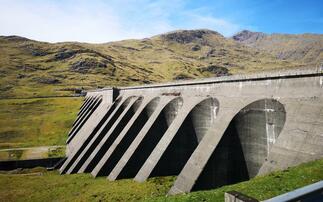Pension schemes holding more than £1bn of assets will be required to publicly disclose climate risk in their portfolios by 2023 or face penalties
UK pension schemes will soon be required to publicly disclose the risks posed to their savers' investments by climate change and the net zero transition under new rules proposed by the Department for Work and Pensions (DWP) today.
The plans, which are now subject to a six-week consultation launched today, would see pension schemes holding £5bn or more in assets - amounting to roughly 100 schemes - have to assess and publicly report on climate risk by 2022 or face penalties from the Pensions Regulator.
Then, from 2023, all schemes holding £1bn or more in assets - totalling around 250 more schemes - would also have to meet the same requirements.
DWP said the rules would compel pension schemes to report on the greenhouse gas emissions of their investment portfolios, as well as the risks they face from climate impacts and the transition towards a net zero emission economy.
Specifically, schemes would be required to embed the reporting guidelines of the Taskforce on Climate-related Financial Disclosures (TCFDs) into their organisation, including in relation to governance, strategy, risk management, metrics, and guidance, DWP explained.
The new rules, which were first touted by the government in February, would make the UK the first major economy in the world to legally require major pension schemes to assess and disclose climate risks and greenhouse gas emissions across their portfolios.
Work and Pensions Secretary Thérèse Coffey said the proposals - which she unveiled today during a visit to Glasgow where the UK is set to host next year's COP26 UN climate summit - marked "one of the most significant steps to date in the UK's progress on tackling climate change".
"We were the first major economy to commit to reaching net zero by 2050 - to deliver this we must start now, working with investors and others to achieve this ambitious target," she said. "These measures will ensure pension schemes are in an ideal position to drive change to a sustainable, low carbon economy which will benefit everyone."
The proposals will signal an intent that pension schemes should report on the extent to which their portfolios are aligned with the Paris Agreement, which sets the goal of limiting average global warming to 1.5C or 'well below' 2C by the end of the current century, the DWP said.
Under the new rules, pension schemes would be required to analyse the implications of a range of temperature scenarios for their assets in order to "prompt strategic thinking about climate risks and opportunities".
Government powers to enact the measures set out in the consultation - which runs from today until 7 October - are included in the DWP's Pensions Scheme Bill, which is currently before the House of Commons.
Former Bank of England Governor Mark Carney - now the UN's Special Envoy for Climate Action and Finance, as well as the UK Prime Minister's Finance Advisor for COP26 - said the new risk disclosure rules were a crucial pillar in the UK's efforts to deliver on its net zero emissions target.
"To achieve an orderly transition to net zero, managing climate risk and improving resilience needs to be at the heart of all financial decision-making," said Carney, a key figure in developing the international TCFD guidelines which were launched in 2017.
"Corporates, asset owners, including pension schemes, and asset managers should use the TCFD framework to disclose climate-related risks and opportunities," he added. "By requiring pension schemes to report against the Taskforce's recommendations, the occupational pensions of over 24 million UK citizens, representing over £1.3trn of investments, can be managed to mitigate the risks from climate change and seize the opportunities from an economy-wide transition to net zero."
The pensions industry has been the focus of increasing attention from climate campaigners and sustainable investors, as pressure on the financial sector to shift investments and financial support away from fossil fuels and high carbon activities towards the green economy has intensified.
Concerns over climate-related financial losses and stranded asset risks have also increased in recent months, as the fallout from the coronavirus crisis has led to a string of bankruptcies and write downs among leading fossil fuel firms.
Last month £12bn master trust Nest became the first UK pension scheme to commit to ensuring its entire investment portfolio aligns with net zero emissions by 2050, in addition to fully divesting from companies involved in thermal coal, oil sands, and Arctic drilling by 2025.
The new climate risk disclosure rules announced today are likely to raise concerns over government interference in the pensions industry in some quarters, however. When the plans were first touted by the DWP back in February the Pensions and Lifetime Savings Association (PLSA) warned the move could hand the government "unprecedented powers" over pension schemes' investment strategies. The pensions trade body had claimed the proposals went too far in dictating the terms of risk disclosure.
In contrast, green campaign groups welcomed today's the announcement.
ClientEarth lawyer Kyla Taylor said the environmental law NGO needed to study the full details of the proposals unveiled today, but stressed that they could form a "crucial next step towards meaningful governance and reporting of climate risks by pension schemes".
"It stems from the ongoing climate change risk amendments proposed in the Pension Schemes Bill, which are also welcome," she said. "It could serve as a framework for others within and outside of the pensions industry that need to follow suit. We hope the detail of the consultation will provide ambitious proposals that require the industry to take strategic action on climate change and hold those who are not acting on climate risks to account."
The Net Zero Investment Hub is brought to you in partnership with Schroders, as part of its support for the world's first Net Zero Festival this autumn. All the content on the Hub is fully editorially independent unless otherwise stated.
You can find out more about the Net Zero Festival and reserve your place here.









